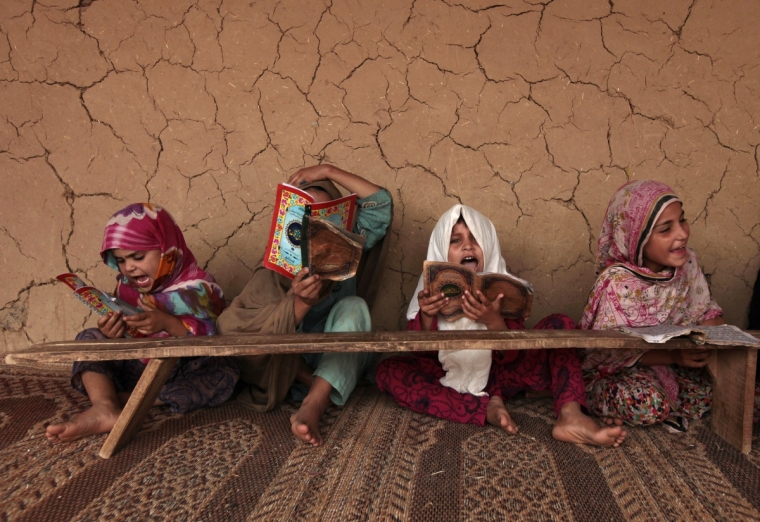Reading, Writing, Arithmetic – and Religious Intolerance

WASHINGTON (Christian Examiner) – The U.S. Commission on International Religious Freedom (USCIRF) has issued a troubling report on the religious content of textbooks in Pakistan's schools.
According to a study commissioned by USCIRF and conducted inside Pakistan by the Islamabad-based Peace and Education Foundation, the textbooks are rife with factual errors about religions other than Islam, false historical accounts of world events, and outright attempts to encourage the suppression of minority faiths in the country.
Textbooks are an important means for communicating the importance of national unity in any country and, in the case of Pakistan, a predominately Muslim country, the books find their way into the hands of more than 41 million school children. The problem, according to USCIRF, is that the texts negatively portray religious minorities and depict them as untrustworthy and inferior.
Missing from these textbooks are any references to the rights of religious minorities and their positive contributions to Pakistan's development. These textbooks sadly reflect the alarming state today of religious freedom in Pakistan. A country's education system, including its textbooks, should promote religious tolerance, not close the door to cooperation and coexistence.
"Pakistan's public school textbooks contain deeply troubling content that portrays non-Muslim citizens as outsiders, unpatriotic, and inferior; are filled with errors; and present widely-disputed historical 'facts' as settled history," USCIRF Chairman Robert P. George said in a statement.
"Missing from these textbooks are any references to the rights of religious minorities and their positive contributions to Pakistan's development. These textbooks sadly reflect the alarming state today of religious freedom in Pakistan. A country's education system, including its textbooks, should promote religious tolerance, not close the door to cooperation and coexistence."
Ironically, this is the second such study commissioned by USCIRF. In 2011, another study identified passages in textbooks which the Commission deemed intolerant of other religions and worldviews.
The new study found that many of the passages discussed in the 2011 report were either removed from the books or heavily edited in new editions. However, new passages filled with religious bias were included in the new books – including those which portray Westerners as colonial oppressors and Hindus and Indian nationalists. India is considered the greatest enemy of Pakistan.
The report claims, for instance, that history and social studies texts are built upon a "polemical historiography," or one targeting the enemies of the state.
"In the social studies, Pakistan studies, and history curriculums students are taught a version of history that promotes a national Islamic identity of Pakistan and often describes conflicts with India in religious terms. The conflation of national and religious identities creates a narrative of conflict and historic grievance between Pakistani Muslims and Indian Hindus," the report concludes.
There is also a heavy emphasis on Islam as the "paramount feature" of Pakistan's national identity in the textbooks. The adherence to Islam, one textbook claims, makes cooperation with Hindus impossible.
"This theme ignores not only the religious diversity of Pakistan and the many contributions of religious minorities throughout the nation's history, but also places religious minority students in a precarious status of either inherently flawed Pakistani citizens at best, or foreigners and enemies of the state at worst," the report claims.
In addition to the emphasis on Muslim nationalism, the books also misrepresent other religions – especially Christianity, which is portrayed as the religion of "untrustworthy missionaries" who are aligned with colonial governments. In one instance, an eighth grade social studies text claims Christian pastors have "degraded other religions" and promoted the "illegal and ignorant rule of the Church."
Christians are also said to have learned kind-heartedness and tolerance from Muslims.
Perhaps the most disturbing feature of the textbooks is the effort to glorify war and war heroes, the report claims.
"In particular, the conquest of Sindh by Muhammad bin Qasim and 17 famous attacks by Sultan Mehmood Ghaznavi are included proudly in every textbook. Highlighting these two events as the beginning of civilization in the sub-continent, while ignoring the evolution of art, architecture, and culture, remains a key problem in textbooks. In post-independence history, wars with India are emphasized and examples of peace initiatives are largely ignored, resulting in an unbalanced historical discourse focused on intractable conflict. This narrow nationalism only fulfills the task of educating Pakistanis in the most superficial way," the report claims.
Every year since 2002, USCIRF has recommended the U.S. State Department place Pakistan on its list of Countries of Particular Concern. That designation means persecution is real and systemic in a particular location and improvements must be made alongside any furtherance toward successful diplomatic relations.
As for one of those improvements, USCIRF recommended another reformation of the children's textbooks, to include more references to religious freedom as a constitutional protection given to all citizens, including religious minorities; a "constructive patriotism" that isn't built on fear of minority faiths or ethnic groups; an urging that all groups co-exist peacefully; and corrections to the "historical omissions and misrepresentations" in the books.
USCIRF's 2016 report on religious freedom in Pakistan and other countries will be published at the end of this month.
The Peace and Education Foundation, which conducted the study, encourages madrasahs to adopt modern curricula on science, religious tolerance and human rights. It also asks teachers to promote critical thinking and "peacebuilding skills" among students.